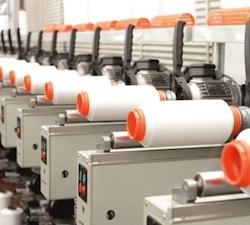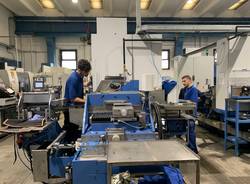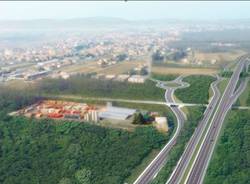Silk-throwing in Garabiolo, from the mountains, a challenge to the Chinese
The company, which has been in the hamlet near Maccagno for more than 50 years, employs 30 people, keeping part of the textile production chain going.
 Hidden among the villages in Val Veddasca, just ten minutes by car far from Maccagno, the silk-throwing factory of Garabiolo is one of the few left in the area around Luino. The company has been owned by the Marazzini family since 1959, and it manages to survive, despite the crisis, and Asian and European competition. Sheltered by the mountains, TFS manufactures a quality product that is a perfect mix of tradition and innovation that, despite everything, is keeping Italy going.
Hidden among the villages in Val Veddasca, just ten minutes by car far from Maccagno, the silk-throwing factory of Garabiolo is one of the few left in the area around Luino. The company has been owned by the Marazzini family since 1959, and it manages to survive, despite the crisis, and Asian and European competition. Sheltered by the mountains, TFS manufactures a quality product that is a perfect mix of tradition and innovation that, despite everything, is keeping Italy going.
The silk-throwing factory in Garabiolo, which is far from the village centre and more than an hour from the nearest motorway, completes with the Chinese. How do you do it? The owner, Giovanni Marazzini, sighs.
“You forget that it’s almost two hours from our offices in Parabiago … It’s still going thanks to all the investments made over the years. Basically, we invested everything we could in development, purchasing machinery that consumed as little energy as possible, considering that costs are very high in Italy, and concentrating on a quality product.”
When was TFS founded?
But today, you make another kind of product here …
So, also another type of market …
Who are your customers exactly?
And what about furnishings?
Let’s return to Varese …
What relationship do you still have with the area?
How many employees work here?
And has the level of employment increased over the last few years?
How is the twisting work organised in Garabiolo?
Here the administration listens closely to you, but is this aspect still important?
“It’s absolutely essential, especially nowadays. You’ve seen the road that leads to the factory. It just takes a heavy snowfall to stop shipments; summer storms have caused many a power cut. For small incidents like these, due also to the location of the company, we turn to the administration, who have always helped us.”
La community di VareseNews
Loro ne fanno già parte
Ultimi commenti
lenny54 su I no vax sono tornati a colpire in provincia: imbrattati i muri della redazione di Varesenews
malauros su I no vax sono tornati a colpire in provincia: imbrattati i muri della redazione di Varesenews
Felice su I no vax sono tornati a colpire in provincia: imbrattati i muri della redazione di Varesenews
PaoloFilterfree su A Varese Salvini prova a ricucire passato e futuro della Lega, ma Bossi non c'è
axelzzz85 su A Varese Salvini prova a ricucire passato e futuro della Lega, ma Bossi non c'è
elenera su A Varese Salvini prova a ricucire passato e futuro della Lega, ma Bossi non c'è














Accedi o registrati per commentare questo articolo.
L'email è richiesta ma non verrà mostrata ai visitatori. Il contenuto di questo commento esprime il pensiero dell'autore e non rappresenta la linea editoriale di VareseNews.it, che rimane autonoma e indipendente. I messaggi inclusi nei commenti non sono testi giornalistici, ma post inviati dai singoli lettori che possono essere automaticamente pubblicati senza filtro preventivo. I commenti che includano uno o più link a siti esterni verranno rimossi in automatico dal sistema.